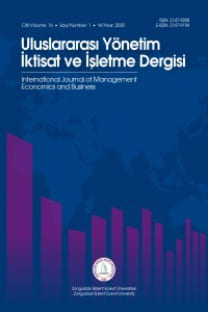TÜRKİYE'DE KURUMSAL NAKİT MEVCUDU VE KURUMSAL YÖNETİM KALİTESİ ARASINDAKİ İLİŞKİ
Bu çalışma, kurumsal yönetim kalitesinin 2009-2013 yılları arasında Borsa İstanbul-100 endeksinde listelenen firmaların nakit mevcutları üzerindeki etkisini incelemektedir. Sistem-GMM panel regresyonları kullanılarak hipotez test edilmiştir. Kurumsal yönetim kalitesinin düşüşüyle, kurumsal nakit mevcudunun arttığı sonucuna varılmıştır. Öyleyse, yatırımcı korumasının zayıf olduğu durumlarda, yöneticiler firma kaynaklarını kendi çıkarları için kullanırken, hissedarların çıkarlarını gözönüne almamaktadırlar. Bu çatışma kurumsal yönetim kalitesinin artışı ile çözülebilir.
Anahtar Kelimeler:
Nakit Mevcudu, Kurumsal Yönetim Kalitesi, Panel Data, Sistem GMM, Borsa Istanbul
CORPORATE CASH HOLDINGS AND CORPORATE GOVERNANCE QUALITY IN TURKEY
This paper investigates the role of corporate governance quality on corporate cash holdings of the firms listed in Borsa Istanbul 100 Index for the period 2009-2013. System- GMM panel regressions are used in order to test the hypothesis. It is found that as the corporate governance quality decreases, cash holding ratios of the firms increase. Therefore, in case of poor investor protection, the managers use the firms' resources for their own interests at the expense of shareholders. This conflict can be solved with the increased corporate governance quality
Keywords:
Corporate Cash Holdings, Corporate Governance Quality, Panel Data, System-GMM, Borsa Istanbul,
___
- Abdioğlu N., Khurshed, A. & Konstantinos, S. (2013). Foreign institutional investment: Is governance quality at home important? Journal of International Money and Finance, 32, 916-940.
- Al-Najjar & Belghitar, Y. (2011). Corporate cash holdings and dividend payments: Evidence from simultaneous analysis. Managerial and Decision Economics, 32, 231–241.
- Ammann, M., Oesch, D. & Schmid, M.M. (2011). Cash holdings and corporate governance http://wizard.korea.ac.kr/user/aicg/data/Cash%20Holdings%20and%20Corporate %20Governance%20Around%20the%20World_David%20Oesch.pdf
- Aoyagi, C.& Ganelli, G. (2014). Unstash the cash Corporate governance reform in Japan. IMF Working Paper, WP/14/140
- Arellano, M.& Bover, O. (1995). Another look at the instrumental variable estimation of error correction models. Journal of Econometrics, 68, 29–51.
- Basheer, M. F. (2014). Impact of corporate governance on corporate cash holdings: An empirical study of firms in manufacturing industry of Pakistan. International Journal of Innovation and Applied Studies, 7(4), 1371-1383
- Blundell, R.& Bond, S. (1998). Initial conditions and moment restrictions in dynamic panel data models. Journal of Econometrics,87, 115–143.
- Boubaker, S.& Derouiche, I.& Nguyen, D.K. (2015). Does the board of directors affect cash holdings?A study of French listed firms. Journal of Management and Governance, 19(2), 341-370.
- Bushee, B.J., Carter, M.E.& Gerakos, J. (2010). Institutional investor preferences for corporate governance mechanisms. The Wharton School of the University of Pennsylvania Working Paper.
- Chen, Y. & Chuang, W. (2009). Alignment or entrenchment? Corporate governance and cash holdings in growing firms. Journal of Business Research, 62, 1200-1206.
- Dittmar, A., Mahrt-Smith, J. & Servaes, H. (2003). International corporate governance and corporate cash holdings. Journal of Financial and Quantitative Analysis, 38, 111–34.
- Drobetz, W. & Grüninger, M. C. (2007). Corporate cash holdings: evidence from Switzerland. Financial Markets and Portfolio Management, 21, 293–324.
- Ferreira, M. A. & Vilela, A. S. (2004). Why do firms hold cash? Evidence from EMU countries. European Financial Management, 10, 295–319.
- Ginglinger, E. & Saddour, K. (2007). Cash holdings, corporate governance and financial constraints. Accessed: 04.03.2016
- http://papers.ssrn.com/sol3/papers.cfm?abstract_id=2154575
- Gill, A. & Shah, C. (2012). Determinants of corporate cash holdings: evidence from Canada. International Journal of Economics and Finance, 4(1), 70-79.
- Guney, Y., Ozkan, A. & Ozkan, N. (2007). International evidence on the non-linear impact of leverage on corporate cash holding. Journal of Multinational Financial Management, 17, 45–60.
- Harford, J. (1999). Corporate cash reserves and acquisitions. Journal of Finance, 54, 1969-1997.
- Harford, J., Mansi, S. A.& Maxwell, W. F. (2008). Corporate governance and firm cash holdings in the US. Journal of Financial Economics, 87, 535–55.
- Hsu, W.Y., Huang, Y.R. & Lai, G. (2015). Corporate governance and cash holdings: Evidence from the U.S. property-liability insurance industry. The Journal of Risk and Insurance, 82(3), 715–748
- Jensen, M. (1986). Agency costs of free cash flow, corporate finance and takeovers. American Economic Review, 76, 323–329.
- Kalcheva, I., & Lins, K.V. (2007). International evidence on cash holdings and expected managerial agency problems. Review of Financial Studies, 20, 1087–112.
- Ku, C., Lee, T.H., Chen, H. & Chang, D.Q. (2013). Excess cash holding and corporate governance: A comparative study of Taiwan and Mainland China firms. International Journal of Humanities and Social Science, 3(21), 53-70.
- Kusnadi, Y. (2003). Corporate cash holdings, board structure, and ownership concentration: http://citeseerx.ist.psu.edu/viewdoc/summary?doi=10.1.1.203.4026 from Singapore. Accessed: 04.03.2016
- Lee, K.W. & Lee, C. (2009). Cash holdings, corporate governance structure and firm valuation. Review of Pacific Basin Financial Markets and Policies, 12(3), 475- 508.
- Opler, T., Pinkowitz, L., Stulz, R. & Williamson, R. (1999). The determinants and implications of cash holdings. Journal of Financial Economics, 52, 3–46.
- Ozkan, A. & Ozkan, N. (2004). Corporate cash holdings: an empirical investigation of UK companies. Journal of Banking and Finance, 28, 2103–34.
- Paskelian, O.G., Bell, S. &Nguyen, C.V. (2010). Corporate governance and cash holdings: A comparative analysis of Chinese and Indian firms. The International Journal of Business and Finance Research, 4(4), 59-73.
- Pinkowitz, L., Stulz, R. & Williamson, R. (2003). Why do firms in countries with poor protection of investor rights hold more cash?. Working paper, Georgetown University.
- Roodman, D. (2009). How to do xtabond2: An introduction to difference and system GMM in Stata. The Stata Journal, 9(1), 86-136.
- Stulz, R. (1990). Managerial discretion and optimal financing policies. Journal of Financial Economics, 26, 3–27.
- ISSN: 2147-9208
- Başlangıç: 2005
- Yayıncı: Zonguldak Bülent Ecevit Üniversitesi
Sayıdaki Diğer Makaleler
BANKALARIN İFLAS RİSKLERİNİN ÖLÇÜMÜNDEKİ KRİTERLERİN ÖNEM DERECELERİNİN AHP İLE BELİRLENMESİ
Mehmet PEKKAYA, Figen Erol DEMİR
MADDİ DURAN VARLIKLAR STANDARDI VE MUHASEBELEŞTİRİLMESİ
Ahmet Vecdi CAN, Şuayyip Doğuş DEMİRCİ
YALIN ÜRETİM VE TAM ZAMANLI ENVANTER YÖNETİM STRATEJİSİ
M. Başaran ÖZTÜRK, E. Ensari ŞAHİN, Ceyda AKTAN
ULUSLARARASI FİNANSAL RAPORLAMA STANDARTLARININ KAPSAMI: SEÇİLMİŞ 7 SEKTÖR BAZINDA İNCELEME
Şuayyip Doğuş DEMİRCİ, Bilge ÖNAL
TÜKETİCİ KREDİLERİNDE PEŞİN ÖDENMİŞ FAİZ VE VERGİSEL YÜKÜMLÜLÜKLERİN İADESİ
